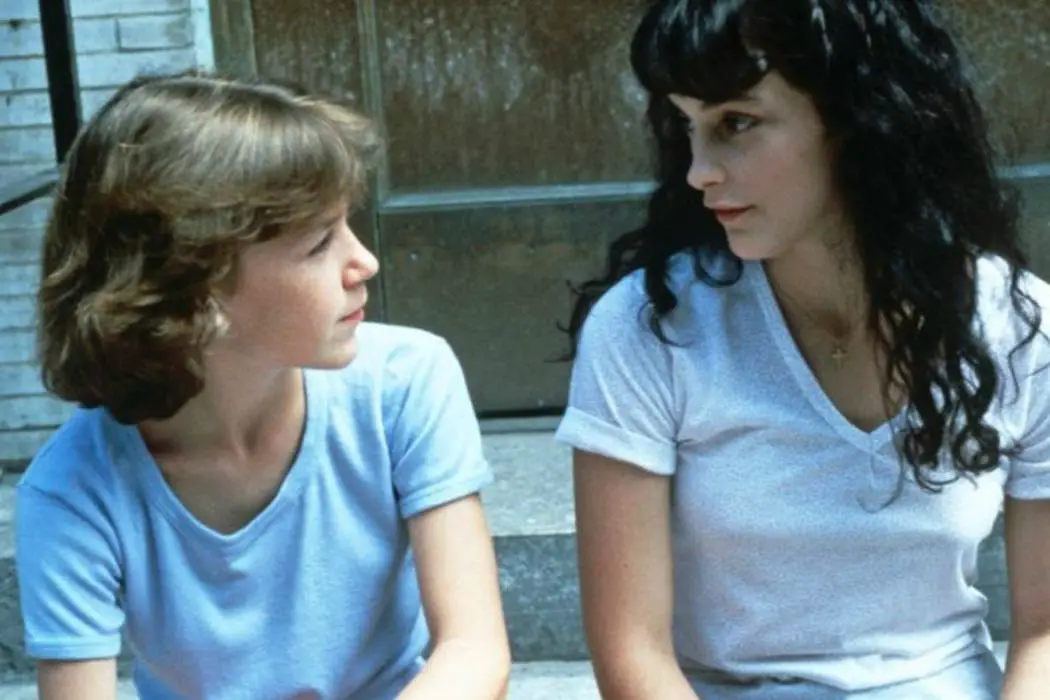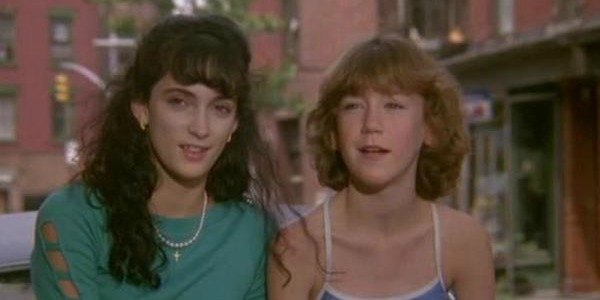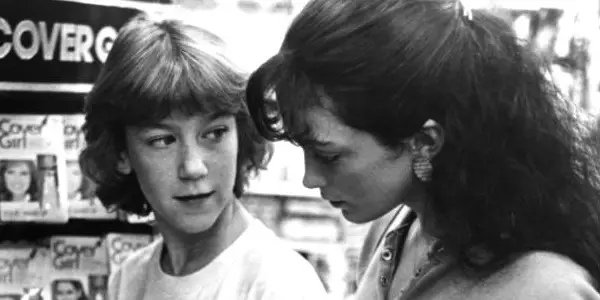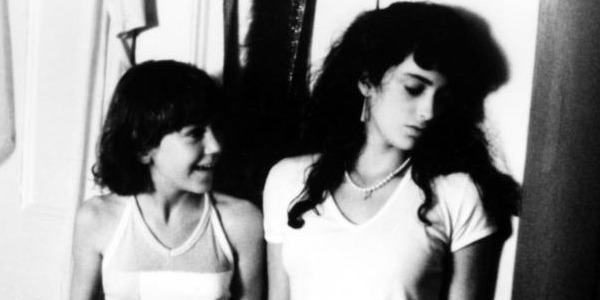OLD ENOUGH: A Girlhood Cult Classic Tragically Lost In Coming-Of-Age Canon

Sasha has written for Roger Ebert's website, The Worcester Journal,…
Marisa Silver wrote and directed Old Enough (1984) while still a student at Harvard University and was only 23 when the film won the Grand Jury Prize at Sundance. Knowing that she was hardly old enough to call herself an adult when she made this movie (and that she made it with the help of her older sister, producer Dina Silver) brings an especially unusual perspective to this somehow little-known film. Old Enough follows two girls living worlds apart on the same street in New York’s lower east side, with only cultural barriers and class divides to differentiate their mutual spirit – how had I never heard of this movie before?
The premise sounds fairly simple: 11-year-old Lonnie (Sarah Boyd) comes from an upper-class background and lives in an enormous, elegant apartment building with just her parents and younger sister (Alyssa Milano, in her first film role), while street-smart and colorful teenager Karen (Rainbow Harvest) comes from a modest, religious, working class family. Naturally, they discover each other and become infatuated with the exoticism of the other’s lifestyle. Though it begins and ends as you’d most likely expect, the entire middle brings up a huge number of weighty themes – perhaps too many for such a short film – that reach far beyond the simple coming-of-age tropes one would predict walking into it.
Above all, Old Enough is an affectionately accurate depiction of how it feels to grow into an age when the approval of your peers becomes more important than the approval of your parents. You start to choose your own friends based not just on shared interest or parent-planned playdates, but on the kind of image you imagine emulating, and who you’d most like to see reflected in yourself.
A young woman’s approach to writing young women
I never fully appreciate the differences in how female characters are portrayed when directed by men versus women until I see something like Old Enough. It’s a wonderful thing, to see women and girls in film playing with and up against each other in ways that are neither annoying to us nor antagonistic to each other, neither silly nor self-serious – they just are.
The major difference in seeing female characters under the eye of a female director is that the audience is rarely manipulated into taking sides. This was the most significant part of Old Enough, to me. Lonnie and Karen are our protagonists, for sure, but the entire cast of characters and family members are all somewhat, impressively (even in the much smaller roles) well-rounded and not totally predictable – which isn’t always easy in these seemingly classic summer stories of child protagonists and their semi-dysfunctional families.

Silver’s treatment of the parents was particularly realistic and restrained. Although characterization of Karen’s father (Danny Aiello, Sal of Do the Right Thing) could be accused of leaning on some stereotypes, even he isn’t a one-note figure. It seems like he’s being set up as a hard-ass when Karen’s brother Johnny (Neil Barry) shows up late to help him work, but the tense family moment quickly dissolves into laughter and a teasing dance – a mood change I was relieved to be surprised by.
Likewise, Lonnie’s mother (Fran Brill) seems like she’s set to be an all-too-classic distant nag in the beginning, discussing mundane upper-class scheduling details at the breakfast table and giving Lonnie a hard time for not wearing the headband she’s told she looks so cute in (she prefers experimenting with a long scarf tied around her forehead). To my pleasant surprise, however, Lonnie’s mother gets a number of other scenes to show the other sides of her maternal personality – she is surprised, but certainly far from angry, when she catches Lonnie trying on her jewelry and makeup: “I just…didn’t know you were into that kind of thing.”
I also love the scene where Lonnie is desperate to ask her mother about sex without saying so many words: “You don’t tell me everything, you know,” Lonnie cautiously begins. “There’s lots you don’t tell me.” Their relationship is one of the most truthful aspects of Old Enough, capturing every role mothers must take on for their daughters without exaggerating any of them.
The adolescent gaze
Silver’s depiction of girlhood, womanhood, and femininity is complicated immensely with the arrival of Carla (Roxanne Hart), the slender, trendy 32-year-old who moves into the previously empty apartment above Karen’s family home. Karen has seen Carla on the street before and immediately admires her aura and style. There’s a great moment when the kids—Lonnie, Karen, and Johnny—are all watching Carla, with her long legs and short shorts, moving her furniture into the building. All three of them are seen imposing their own gaze onto her, and we see them all noticing something different: Johnny sees a new object of desire, Karen sees a new role model, and Lonnie (having developed a bit of a crush on Johnny after a somewhat bizarre and definitely inappropriate encounter with him) sees a threat to her relationship with both of them.

So much of Old Enough is about looking and seeing, making observations and reacting to them by way of imitation; when Carla comes up to Karen to compliment her gold belt, we also notice Karen’s gold nail polish, which she had previously noted to Lonnie in awe after seeing it on Carla (“Did you catch that nail polish? Gold.”). Karen lifts her fingers to her mouth as she watches Carla walk away, and we see Lonnie mimic Karen by putting her fingers to her mouth – and repeat. The significance of creating and crafting one’s appearance, especially as a young girl who only begins to find herself by imitating someone else, comes up all over the place.
The first time we see either of our protagonists they are in front of a mirror, experimenting, practicing, perfecting some new look before introducing their new selves to the world. The fact that Milano’s character is still playing house with her baby dolls just shows she’s still at the age of imitating her parents, but we watch her watching Lonnie often enough to know that she’ll be taking cues from her sister before to long – just as she has from Karen, and Karen from Carla.
A(n appropriately) naïve take on race
While the film is undeniably an impressive debut, especially knowing it came from the writing and direction of a 23-year-old, there are certainly areas where Silver’s own youth and naivety almost come into focus. Regarding race, for instance, I wasn’t sure what to make of Lonnie’s solo adventure into Carla’s working neighborhood, where she is quickly frightened by a large group of Spanish-speaking older men who send a few intimidating comments and sexual gestures her way before she runs away to hide in a grocery store. Karen is clearly uncomfortable once they reach the outskirts of their own neighborhood and tries, in her older, inarticulate way, to articulate to Lonnie why they should leave. “We don’t belong here, get it?” she says pointedly.
On the other hand, I can see Silver trying to recreate the feeling of simultaneous fear and independence any child must have the first time they realize they are alone among a majority of others who are different in some way, and stumbling into a primarily non-English-speaking neighborhood in the case of two young white girls certainly gets the job done. If there were anything to take away from this scene, I would say it’s something about the mixed maturity and ignorance on the part of both Lonnie and Karen – Karen is old enough to recognize cultural barriers and doesn’t want to cross lines she feels she shouldn’t (in addition to acting on her own pure discomfort), and Lonnie thinks herself brave for daring to venture where her heroine won’t.

When she triumphantly returns to Karen with a banana purchased during her hideout in the grocery store, Lonnie thinks she has proved something to her idol about her own immaturity. “You could’ve gotten killed!” Karen scolds, all parent-like. “Yeah, but I didn’t,” Lonnie responds with pride. The wisdom of age and ignorance of youth bring equal and opposite strengths and weaknesses to each situation the two girls find themselves in and the film often feels like a depiction of generational misunderstanding as a result, despite the fact that the two are likely just three or four years apart.
Looking up and talking down
The generational divide could easily be a projection of my own frustrated view of the split between baby boomers and millennials, wherein my generation – even as we’ve become adults – still often feels like a child punctuating every answer the grown-ups give them with a “But why?” or “How come?” (and I don’t think this is a fault, by any means). To zero-in more specifically on the perspective Karen and Lonnie offer each other, Old Enough takes a great, complex look at the dynamic between siblings and, more broadly, our heroes and heroines and what we teach and learn from them, inadvertently or otherwise.
Though the younger of our two leading females, Lonnie is the older sister in her family; she bears the responsibility – though she may not know it yet – of being a role model, and though little Milano doesn’t offer much to the plot, her role as observer, admirer, and secret student of her elder sibling is a wonderful mirrored perspective of Lonnie’s role in relation to Karen.
Similarly, Karen is the younger sibling in her family; with just an older brother to goof around and sometimes disagree with. She has no one to pass her own learned wisdom onto, and may not have realized the thrill of playing teacher until she discovered someone who had a lot to learn and, more importantly, was more than willing to take lessons.

My generational comparison stems primarily from the fact that although Karen is equally intrigued by Lonnie’s upper-class life, she is far more reluctant to learn and engage with it, and it is much more difficult for her to admit when she is in the wrong. The differences even in the girls’ everyday vernacular are comical, if not slightly over the top, as illustrated in their imaginary dinner scene.
While touring the empty apartment in Karen’s building (after she proudly steals the key from her father), the two entertain themselves with a delightful exchange of ideas, showing to a point of caricature just how far apart their daily lives are. Lonnie creates an imaginary butler, “Charles,” who serves them their imaginary dinner, and we immediately see the difference between them based on their opposing ideas of an ideal menu. The game of pretend is one moment showing Karen truly letting herself play with this girl who is both not much younger than herself, yet also, so much younger than herself. The irony of the 11-year-old imagining duck, white wine, and vichyssoise while the teenager demands steak and a chocolate shake is obvious, but one of only a few moments in the film which pushes its attraction-of-opposites theme to a point of being a little too on the nose.
Conclusion
The primary flaw with Old Enough is that it’s difficult to pinpoint exactly what that flaw is—there is a lot going on in this 90-minute movie, thematically and on a scene-by-scene basis, and it might be just a bit too much for a story centered on such young protagonists. I can see what Silver was going for and I admire the premise of depicting young (white) womanhood in the same overwhelming and overcomplicated approach that seems to simply be the way of life during the vulnerable stages Lonnie and Karen are both in the midst of.
Individuality, sexuality, morality and other big picture issues are beginning to make unique sense to these girls, and though I sympathize with the weight of feeling pressure to tackle all of them at once, it’s an awful lot for what seems at first like a simple coming-of-age, summer-buddy, pseudo-romantic comedy. Even so, considering the era in which the film was made and the phenomenal visual and audio aesthetic which brings early 1980s New York to life, the fact that Old Enough isn’t at least a film school cult classic by now is nothing short of a neon-colored, new wave synth-pop tragedy.
What other cult classics were you pleasantly surprised to discover later in life? Let us know in the comments!
Old Enough is now streaming on Filmstruck and YouTube.
Does content like this matter to you?
Become a Member and support film journalism. Unlock access to all of Film Inquiry`s great articles. Join a community of like-minded readers who are passionate about cinema - get access to our private members Network, give back to independent filmmakers, and more.
Sasha has written for Roger Ebert's website, The Worcester Journal, and Dictionary.com. She is also the founder/editor-in-chief of Germinal, a new online magazine for politically-minded creative youth. In August, she will begin the MA program for Cinema & Media Studies at USC. It is very difficult for her not to take it personally when people let her know that they tried to watch Mad Men but just couldn't get into it.













